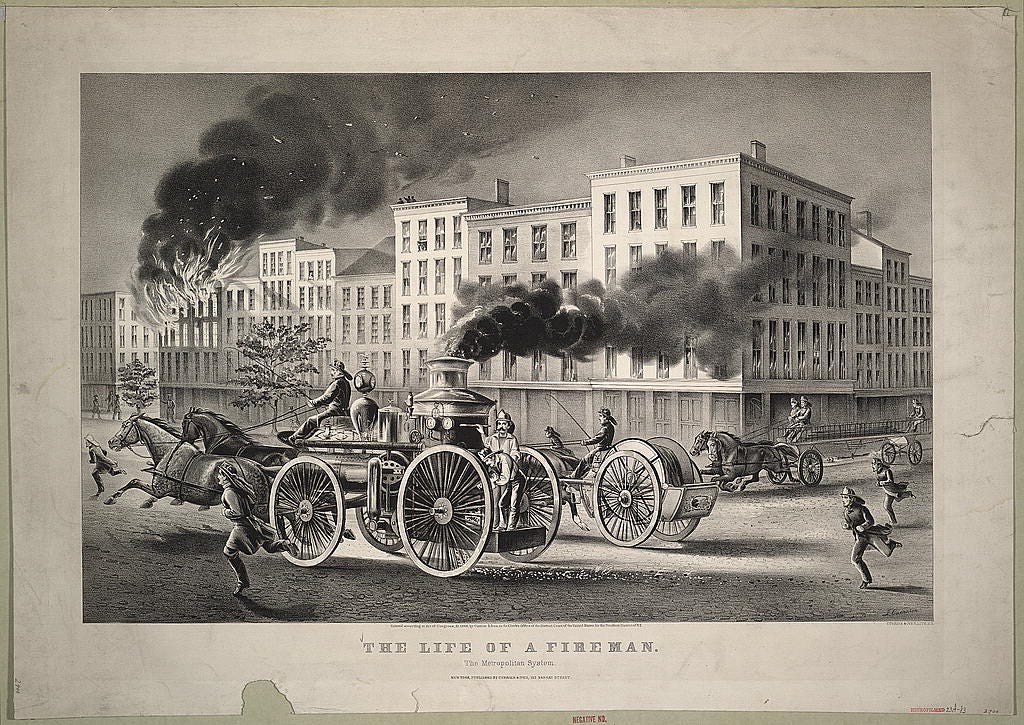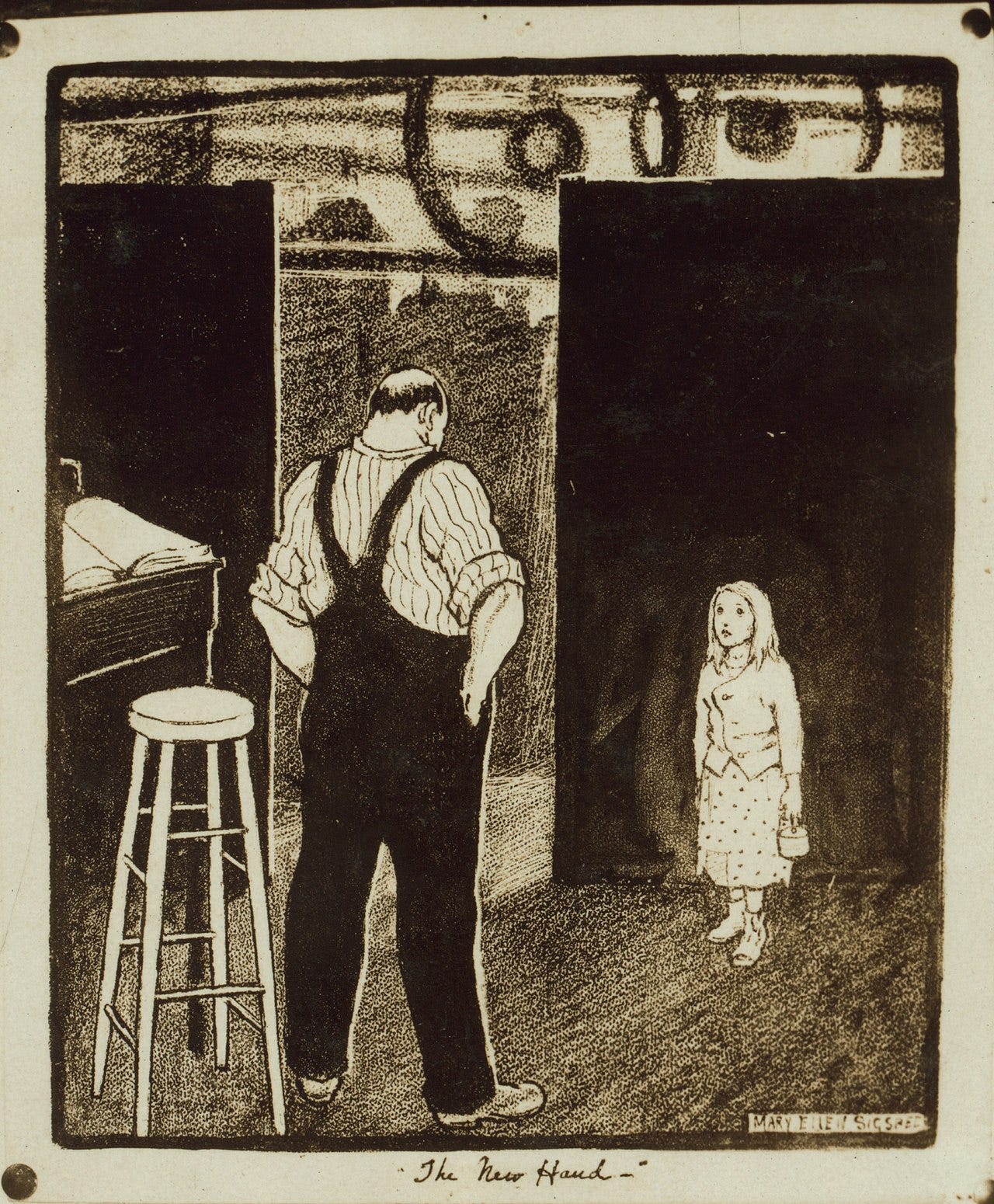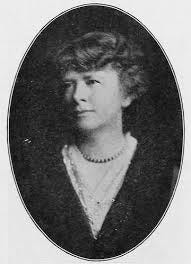It is now late fall. Margaret has re-settled Patty and wants to witness actual conditions in the mill. Frank Spencer reluctantly permits it, and Margaret is struck by his “calm acceptance of the situation.” Bobby McGinnis guides Margaret on her inspection of the factory, and the last third of The Turn of the Tide) begins with Margaret being provoked by what she sees
Eleanor Porter describes Margaret’s tour of the mill very briefly— in 400 well-chosen words. Margaret recoils at the “deafening click-clack of the rattling machines.” She watches a little girl on a stool to reach her loom:
“Her face was thin and drawn looking, with deep shadows under her eyes, and little hollows where the roses should have been in her cheeks.”
“ [Margaret] saw more, much more, until her mind refused to grasp details and the whole scene became one blurred vision of horror…scores of puny little forms with tired-looking faces and dragging feet.”
Determined to act, she moves in with Patty a week before Christmas. She tells Della about the parents who must learn the importance of school. “They don’t know what they are doing to their little children, and I must tell them. I must tell them.” Patty also opposes her plan to lecture the parents, but Margaret goes house-to-house, seeing families in their tenements and urging parents to send kids to school. It is futile. She enrolls the kids, feeds the family and gives them money, but the children are soon working again.
“Her money, if she gave that, was welcome, usually; but her remonstrances and her warnings fell upon deaf, if not angry, ears. And then Margaret perceived why Patty had said she did not understand—there was no such thing as making a successful appeal to the parents. She might have spared herself the effort.”
She is discouraged. School was not an alternative. Attendance requirements were decided by local School Boards and poorly enforced. Fraud was common.
It was as if a child with a teaspoon and a bowl of sand were set to filling up a big chasm: her spoonful of sand had not even struck bottom in that pit of horror!
At Christmas Margaret returns to Hilcrest. She has a heated talk with Frank. The Spencer family will be traveling south after the holiday, but Margaret tells Frank she must stay behind.
“I could not go with you and sing and laugh and dance, and all the while remember that my people back here were suffering.”
She is deaf to Frank’s poignant, final appeal when he actually admits his love for her and she misunderstands:
If you knew that there was some one here who loved you—who loved you with the whole strength of his being, and if you knew that to him your going meant everything that was loneliness and grief, would you—could you—stay?”
But Margaret thinks Frank is pleading for Ned — “playing John Alden to his brother’s Miles Standish.” She refuses to stay at Hilcrest and goes to Patty’s again. Soon after, Frank receives a letter:
“I have taken a large house not far from the mills, and I am having it papered and painted and put into very comfortable shape. Patty and her family will live with me, and we are going to open classes in simple little things that will help toward better living.”
She calls it Mill House. It provides temporary shelter and classes for all ages. Patty and Margaret did not look for the sisters in New York until April. The school drew meager attendance and had poor retention. Kids returned to the mill.
This matter of the school question was a great puzzle to Margaret. Very early in her efforts she had sought out the public school-teachers, and asked their help and advice. She was appalled at the number of children who appeared scarcely to understand that there was such a thing as school. This state of affairs she could not seem to remedy, however, in spite of her earnest efforts. [Emphasis added]
The winter passed and the spring came. Already, the Mill House is a success, and Margaret is troubled, not by restlessness this time, but by emotional overload. She carries the burden of managing Mill House by herself. She misses the “tender care and sympathetic interest” she enjoyed at Hilcrest. Her loneliness is compounded by Bobby’s chilliness.
She confronts him, and he expresses his love.
“Bobby McGinnis, why don’t you help me?” she demanded, tearfully. “Why do you stand aloof and silent to me? Why don’t you come to me frankly and freely, and tell me the best way to deal with these people?”
“I am afraid—I’m afraid of myself,” he cried. “I don’t dare to trust myself within sight of your dear eyes, or within touch of your dear hands—though all the while I’m hungry for both.”
In their melodramatic rapprochement, Margaret renews her commitment to marry Bobby. “Surely there was no one in the world who could so wisely help her in her dear work. Of course she loved him!”
When Ned returns in April, he visits Hill house to see Margaret. He is unhappy at Margaret's simple appearance. He brags of the mill’s efficiency: “We made more money when I wasn’t ‘round than when I was!” Margaret did not speak of her engagement to McGinnis. She is awaiting Frank Spencer’s return before letting it be known.
Although Ned Spencer’s visit is awkward, Margaret is reminded again of the comfort she felt at Hilcrest. She longs to bask in luxury, which surprises Bobby.
“When the people do get home,” she said to Bobby McGinnis one day, “when the people do get home, we’ll take a rest, you and I. We’ll go up to Hilcrest and just play for a day or two. It will do us good.”
“To Hilcrest?—I?” cried the man.
“Certainly; why not?” returned Margaret quickly, a little disturbed at the surprise in her lover’s voice. “Surely you don’t think that the man I’m expecting to marry can stay away from Hilcrest; do you?”
“N-no, of course not,” murmured McGinnis; but his eyes were troubled, and Margaret noticed that he did not speak again for some time.
Margaret finally goes to New York City with Patty to find Arabelle and Clarabelle. After several days in the city they find Mrs. Whalen, who does not know where they are. They search two weeks, but can’t find the twins, and, upon leaving for home, Patty suggest they visit Mont-Lawn, the fresh air camp in Cross Currents. There they meet Clarabella, who works at Mont-Lawn, and they learn that Arabella works in the Mont-Lawn missionary office. Clarabella and Arabella, who is crippled, will go back to the Mill House and become teachers.
Margaret is grateful that Della has planned a vacation at Hilcrest. She relishes the genteel atmosphere. “It had been so long since she had heard low sweet voices in pleasant chat!” Frank Spenser has also returned home, but is obviously ill. Margaret finds herself in his company frequently. “To this end, in spite of her own weariness, she played and sang and devoted herself untiringly to the amusement of the man…”
She suddenly began to appreciate what [Frank] had done for her all those years.
It had been planned that McGinnis should go to Frank with the story of his love for Margaret. This plan was abandoned, however, when Margaret saw how weak and ill her guardian was. The delay in announcing their engagement seems logical to Margaret; Bobby McGinnis, however is hurt at waiting, and grows aware that Margaret’s care for Frank Spenser had a new dimension. “More keenly than ever now she regretted that she must bring sorrow to him in acknowledging her engagement to Bobby.”
When Frank’s health has improved, Bobby McGinnis does tell Frank of the engagement, Frank is hurt but brave. He tells Della, “I want Margaret—happy.” But Bobby is having doubts. Because the people at Hilcrest are upset by the engagement, Margaret returns to Mill House, and tries to split her time between the Mill House and Hilcrest. She sees Bobby almost every day, but when he comes to Hilcrest he feels out of place.
His formal clothes and cautious speech made him feel like a prisoner. He is seldom included in conversation with Margaret’s friends at Hilcrest. Margaret would steer talk to Bobby if it was about the mill, and Bobby would mechanically reply. Soon, she asked Frank about the mill, and Bobby “saw the look in Frank Spencer’s eyes; and after that he did not question again the cause of his own misery… “She does not love me, but she does not know it—yet.”
The climax is in Chapter XXXVII. Margaret is at the Mill House when the mill catches fire, and the two men who love Margaret become trapped in the ruins.
There was a strong east wind, and the fire was rapidly spreading, and had already attacked the next building on the west. The operatives were in a panic. There was danger of great loss of life, and all help possible was needed.”
Margaret opens Mill House for casualties from the Monday night fire. “Mill House looked like a hospital, and every available helper was pressed into service as a nurse… Margaret was everywhere, alert, capable, and untiring.” The crisis seems over as Tuesday arrives, but word comes of the collapse of a building where Bobby McGinnis and Frank Spencer were last seen. They are buried and presumed dead.
It is not until Wednesday that the two men are found. Ned tell Margaret that Frank is alert, but Bobby is unconscious, and she confuses the two men. Impulsively, she calls out Frank’s name, which shocks her. “To think that ’twasn’t Bobby at all that I was thinking of—’twasn’t Bobby at all!” Both men are taken to Mill House to recuperate. She nurses both but spends more time with Bobby, Margaret was bright and cheerful, “but to a close observer there was something a little forced about it. No one seemed to notice it, however, except McGinnis.”
The day before he leaves Hill house, Bobby tells Margaret that he knows that she does not love him anymore.“I’ve seen it coming for a long time,” he went on gently, “and I did not blame you. I could never have made you happy, and I knew it almost from the first.” He tells Margaret that Frank Spencer loves her.
“Bobby, Bobby, you don’t know what you are saying,” she cried agitatedly. “Mr. Spencer does not love me, and he never loved me. …He even pleaded with me to marry another man.” Bobby tells her that during the rescue while, apparently unconscious, he heard Margaret cry Frank’s name. Their engagement ends.
Margaret is uncomfortable at Mill House where Bobby teaches a night class. She tells Della and Frank that she wants to go away to spare Bobby’s feelings. She is not needed at Mill House, which is well-managed and staffed by the twins and Patty. She wants to get away from her work, which does not address the root of her problem. Frank says she has done wonders. But, she says she is a failure. In her distress, she even scorns her own efforts to “divvy up,” citing her income from the mill as hypocritical.
“Margaret, are you mad? What can you mean?”
“Merely this. It is very simple, after all. With one hand I relieve the children’s suffering; with the other I take dividends from the very mills that make the children suffer.”
“I do see, Margaret,” he began gently, “and you are right. It is at the mills themselves that the first start must be made—the first beginning of the ‘divvying up.’ Perhaps, if there were some one to show us”
In this way, Frank discloses his love for Margaret and unravels her mistaken notion that he was pleading for Ned, “when all the while it was I who was hungering for you…” They plight their troth.
To spare Bobby McGinnis’s feelings, Margaret wants to wait before announcing her engagement to Frank. She vacations with Della for the winter. Frank writes and tells of plans:
“Of course the mills must still be a business—not a philanthropy; otherwise we should defeat our own ends. But I shall have your clear head and warm heart to aid me, and little by little we shall win success.”
Margaret receives word of Bobby and Arabella getting engaged. She writes to Frank to tell him. Frank tells Della that he will marry Margaret, and Della sighs:
“It’s exactly what I always hoped would happen,” she said.
END
Illustrations: Google edition of Turn of the Tide and Library of Congress’ collection of Hines photos and Child Labor posters. (Lewis Hine (1874-1940) documented underage workers throughout the US in the Progressive Era.)
Copyright © Jim McIntosh 2025














